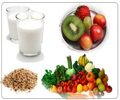Mandatory nutrition labeling has been introduced in Canada for most packaged foods of trans fats.
Mandatory nutrition labeling has been introduced in Canada for most packaged foods of trans fats. This is expected to contribute towards the good health of Canadians in general. Much of the trans fats in our diet come from partial hydrogenation, which is an industrial process which serves to solidify liquid vegetable oils and extends their shelf life in addition to making them more stable to heat.
It is also a known fact that industrial fats are at least 10 times worse than saturated fats with regard to health risks like heart disease. Both contribute towards producing bad cholesterol in the blood. The good (HDL) cholesterol levels are brought down considerably by the industrially produced trans fats, which also damage the arteries by promoting smaller LDL particles in the human blood stream. Endothelial dysfunction is also caused by trans fats.Partially hydrogenated margarine, deep-fried foods, snack foods, vegetable shortening, and commercial baked goods contain industrial trans fats. A Canadian consumes about 5 to 10 grams of trans fats everyday. This can increase as a person starts relying upon commercial food. Canadians consume the largest quantity of trans fats in the world. Natural fats are reportedly less harmful to the health.
A Mediterranean diet on the other hand can lead to a longer life span, according to the British Medical Journal. The Mediterranean diet involves consuming large quantities of fruits and cereals, vegetables, fish, and a low consumption of saturated fats. Alcohol should also be consumed in moderate quantities only, according to this diet. A genuine Mediterranean diet is followed in countries like Greece and Spain.











